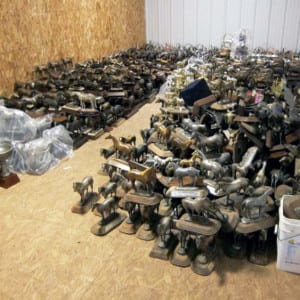DIXON – The U.S. government filed its response to former Comptroller Rita Crundwell’s efforts to retain ownership of about 700 trophies and other possessions.
The response, filed Friday evening, said that allowing Crundwell to keep the items, because their value might be more sentimental, would allow her to benefit from her theft.
“This is especially true for Ms. Crundwell’s substantial trophy collection, as these awards represent the primary motivation of her massive fraud,” the response said. “Until Ms. Crundwell has satisfied this court’s forfeiture order, all of her assets can be forfeited.”
The response came a little more than 2 weeks after Crundwell and her attorney, Ruth Robinson, filed a response to a December motion to seize trophies she won during horse competitions, various pieces of artwork, a computer, her show clothing, bicycles, patio chairs, two motorized scooters and an all-terrain vehicle, among other household items.
Crundwell is contesting the inclusion of the assets based on three arguments: The government took too long to forfeit the items; the government has already forfeited the items; and Dixon has already been significantly compensated for its loss.
In its Friday response, the federal government said “none of these arguments is supported by the facts or the law.”
Crundwell was arrested at City Hall in April 2012 and later pleaded guilty to wire fraud in the theft of nearly $54 million over 2 decades.
She was ordered to pay about $54 million in restitution, of which the government has collected about $9.3 million. There was also a money judgment for about $53 million issued, meaning the U.S. government can go after about $106 million in Crundwell assets.
The city also received about $30 million in a settlement with its former auditors and bank.
In response to the argument that the government took too long seize the assets, the response admits that the process has been more than 2 years, but also notes that Crundwell’s theft happened over 2 decades.
The government also said there is time frame in which assets need to be seized, and that it can “at any time enter an order of forfeiture or amend an existing order of forfeiture to include property.”
In response to the argument that the items were already seized and discarded, the government said it has never filed any motion in federal court to seize the items listed in its motion.
The third argument Robinson made on Crundwell’s behalf in the January response, was that the items would be unlikely to contribute to restitution.
“While the government will undoubtedly claim to the court and to the public that the property at issue is valuable, it is not,” she wrote.
She made a similar argument when contesting the inclusion of Crundwell’s retirement fund reimbursements, saying the city has already received a substantial amount of money in restitution and from its settlement with its former auditors and bank.
CLICK HERE for more from SaukValley.com









